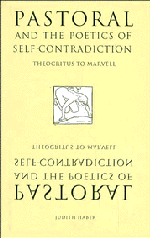
- Cited by 1
-
Cited byCrossref Citations
This Book has been cited by the following publications. This list is generated based on data provided by Crossref.
Wescott, Howard B. 1997. Garcilaso's Eclogues: Artifice, Metafiction, Self-Representation. Calíope, Vol. 3, Issue. 1, p. 71.
- Publisher:
- Cambridge University Press
- Online publication date:
- August 2009
- Print publication year:
- 1995
- Online ISBN:
- 9780511518898




